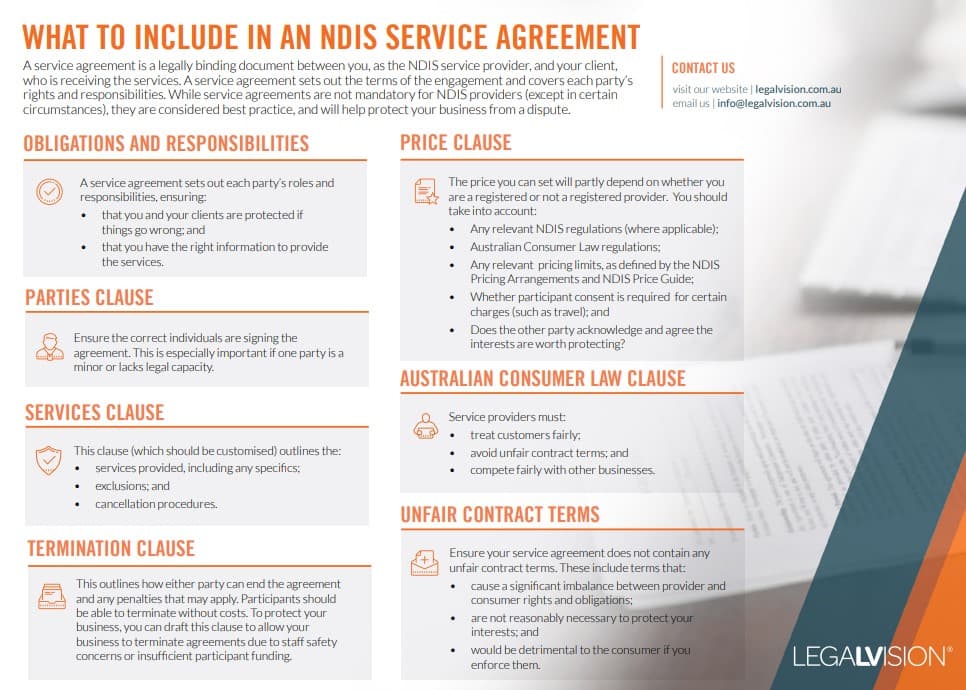When providing services to care recipients, you must have an agreement in place with the recipient that clearly sets out services and pricing. However, a standard services agreement is not enough. Aged care in Australia is governed by a complex framework of regulations and guidelines designed to protect the rights and well-being of older Australians. Complying with the relevant laws, including the Aged Care Act 1997 (Cth), is paramount when creating a service agreement between you as a provider and the care recipient. The Act sets out the foundation for aged care services in Australia and outlines the rights of recipients and your responsibilities as a provider. This article will outline some of the key elements and best practices to follow to ensure your aged care service agreement is compliant.
Key Elements of a Compliant Aged Care Services Agreement
In a nutshell, your aged care services agreement needs to clearly set out:
- what services you will provide;
- who will provide them; and
- how much they will cost.
However, various other key elements form part of a compliant aged care services agreement.
Clear and Concise Language
A compliant service agreement must be written in plain, easy-to-understand language. Avoid jargon or complex legal terms. As a provider of aged care services, you have the responsibility to ensure that the care recipient understands the terms of their service agreement.
Eligibility and Assessment
Aged care services are provided based on a care recipient’s assessed care needs. Consequently, this means that the agreement must specify the recipient’s assessed level of care and eligibility for services.
Care Plan and Budget
Your aged care services agreement must provide a clear and detailed description of what services you are offering to the care recipient. An aged care recipient will have a care plan, which outlines the services that the care recipient will receive under their package. This takes into consideration their individual goals and preferences. They will also have an individual budget, which outlines the funds available in the care recipient’s package and how those funds will be spent.
Fees and Charges
The Aged Care Act governs the fees and charges that can be levied on recipients. You must only charge according to the applicable fee structure and payment rules.
Consumer-Directed Care
Under the Aged Care Act, there is a concept of ‘consumer-directed care’, which allows recipients to have greater choice and control over their care. Your agreement must reflect this principle and include provisions for flexibility and choice.
Rights and Responsibilities
The agreement should detail the rights and responsibilities of both the aged care provider and the recipient. This includes the recipient’s right to:
- safe, high-quality care;
- choice;
- privacy; and
- dignity.
Complaints and Disputes Resolution
Your aged care services agreement should clearly outline the process for lodging complaints and resolving disputes. This is crucial for maintaining transparency and accountability in the care relationship.
Australian Consumer Law
The Australian Consumer Law also applies to aged care services. Accordingly, this means that you cannot include any unfair contract terms, and you cannot contract out of any of your consumer guarantees or other obligations you may have under the Australian Consumer Law.
Record Keeping and Documentation
As an aged care provider, you are required to maintain thorough records and documentation related to service agreements. These records should include a copy of the signed agreement, any amendments, and records of discussions with the recipient or their representative. Proper documentation helps demonstrate compliance in case of any disputes or audits.
Continue reading this article below the formTransparency and Communication
Clear and open communication is essential to maintaining a compliant aged care service agreement. You must ensure that recipients and their representatives fully understand the terms and conditions. For example, you can do this by providing opportunities for questions and discussions to address any concerns or uncertainties.
Never rush or pressure a recipient to sign your aged care services agreement. You have an obligation under law to give them time to seek advice before signing. If you think the care recipient is having difficulty understanding you, you should help them seek help from a trusted family member or other adviser.

This fact sheet will help you to identify the key terms you must include in your NDIS service agreement.
Key Takeaways
Overall, as an aged care provider in Australia, it is your responsibility to ensure that you comply with any applicable laws and regulations. This includes ensuring your services agreement is compliant with the Act. It is also crucial that you build trust and strong relationships with your care recipients, promote the interests and well-being of older Australians, and contribute to the overall quality of aged care services in Australia.
The aged care regulatory space can be challenging to navigate, and laws and regulations are constantly changing. It is important that you, as a provider, seek legal advice and get your aged care services agreements drafted and reviewed by a lawyer.
If you need assistance with your service agreement, our experienced aged care lawyers can assist in reviewing or drafting your aged care service agreements as part of our LegalVision membership. For a low monthly fee, you will have unlimited access to lawyers to answer your questions and draft and review your documents. Call us today on 1300 544 755 or visit our membership page.
We appreciate your feedback – your submission has been successfully received.











